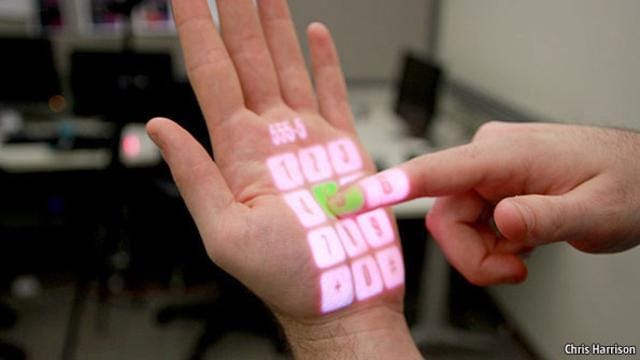New motion-sensing prototype turns your body into a screen.

The Kinect’s technology is largely controlled by the physical borders around it—the finite space between the single-camera -holding-console and the user that can detect movements with an adequate level of precision. Chris Harrison, a researcher at the Human-Computer Interaction Institute at Carnegie Mellon University, in Pittsburgh, has taken the idea a step further with a new prototype called Armura that “monitors people’s movements and gives them what they want, wherever they want it”:
The actual detection is done by infra-red light, which reflects off the user’s skin and clothes. A camera records the various shapes made by the user’s hands and arms. Software then identifies different arrangements of the user’s arms, hands and fingers, such as arms-crossed, thumbs-in, thumbs-out, book, palms-up, palms-down and so on.
According to Mr Harrison, the hands alone are capable of tens of thousands of interactions and gestures. The trick is to distinguish between them, matching the gesturer’s intention to his pose precisely enough that the correct consequence follows, but not so precisely that slightly non-standard gestures are ignored.
The result is that if someone holds his hands out like a book, information is displayed on each palm as if that palm were a page. Folding his hands turns the page. Arm movements will reveal the locations of particular exhibits or shops. And if someone fancies a bit of background music, the appropriate hand and arm movements will control which track is played and at what volume. With clever use of microphones and directional loudspeakers, indeed, it may even be possible to make phone calls.
There are many ways to imagine how this will influence the world of videogames (can somebody say a room-based console?), yes, but this is also a unique example of technological innovation. Gaming hardware and software is often inspired by other areas of the tech world (see the increasing relevance of touch-screens), but now more and more areas of tech are starting to take their queus from gaming itself. With the increasing trend towards infusing games in everythign, it’s hard to see this momentum slowing anytime soon.
–Yannick LeJacq
[via The Economist]



